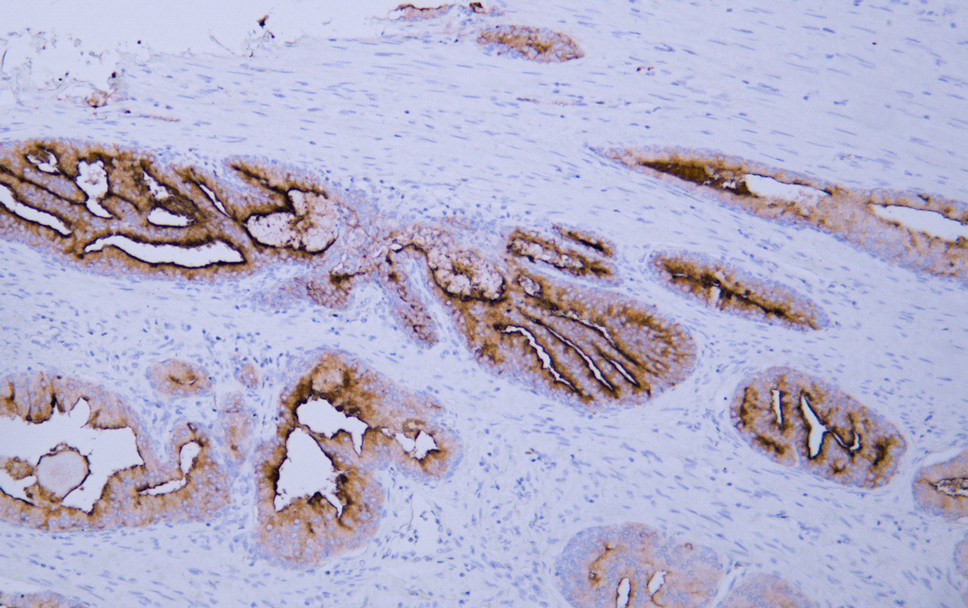Prostate Specific Membrane Antigen (PSMA) (ABT-PSMA) IHC kit
- Catalog No.:IHCM6214
- Applications:IHC
- Reactivity:Human;Mouse;Rat;
- Target:
- Prostate-Specific Membrane Antigen (PSMA)
- Fields:
- >>Alanine, aspartate and glutamate metabolism;>>Metabolic pathways;>>Vitamin digestion and absorption
- Gene Name:
- FOLH1 FOLH NAALAD1 PSM PSMA GIG27
- Protein Name:
- Glutamate carboxypeptidase 2 (EC 3.4.17.21) (Cell growth-inhibiting gene 27 protein) (Folate hydrolase 1) (Folylpoly-gamma-glutamate carboxypeptidase) (FGCP) (Glutamate carboxypeptidase II) (GCPII) (M
- Human Gene Id:
- 2346
- Human Swiss Prot No:
- Q04609
- Immunogen:
- Synthesized peptide derived from human Prostate-Specific Membrane Antigen (PSMA) AA range: 100-200
- Specificity:
- The antibody can specifically recognize human PSMA protein.
- Source:
- Mouse, Monoclonal/IgG1, kappa
- Purification:
- The antibody was affinity-purified from ascites by affinity-chromatography using specific immunogen.
- Storage Stability:
- 2°C to 8°C/1 year
- Background:
- This gene encodes a type II transmembrane glycoprotein belonging to the M28 peptidase family. The protein acts as a glutamate carboxypeptidase on different alternative substrates, including the nutrient folate and the neuropeptide N-acetyl-l-aspartyl-l-glutamate and is expressed in a number of tissues such as prostate, central and peripheral nervous system and kidney. A mutation in this gene may be associated with impaired intestinal absorption of dietary folates, resulting in low blood folate levels and consequent hyperhomocysteinemia. Expression of this protein in the brain may be involved in a number of pathological conditions associated with glutamate excitotoxicity. In the prostate the protein is up-regulated in cancerous cells and is used as an effective diagnostic and prognostic indicator of prostate cancer. This gene likely arose from a duplication event of a nearby chromosomal region. Alter
- Function:
- alternative products:Experimental confirmation may be lacking for some isoforms,catalytic activity:Release of an unsubstituted, C-terminal glutamyl residue, typically from Ac-Asp-Glu or folylpoly-gamma-glutamates.,cofactor:Binds 2 zinc ions per subunit. Required for NAALADase activity.,domain:The NAALADase activity is found in the central region, the dipeptidyl peptidase IV type activity in the C-terminal.,enzyme regulation:The NAALADase activity is inhibited by beta-NAAG, quisqualic acid, 2-(phosphonomethyl) pentanedioic acid (PMPA) and EDTA. Activated by cobalt.,function:Also exhibits a dipeptidyl-peptidase IV type activity. In vitro, cleaves Gly-Pro-AMC.,function:Has both folate hydrolase and N-acetylated-alpha-linked-acidic dipeptidase (NAALADase) activity. Has a preference for tri-alpha-glutamate peptides. In the intestine, required for the uptake of folate. In the brain, modulates
- Subcellular Location:
- Cytoplasmic, Membranous
- Expression:
- Highly expressed in prostate epithelium. Detected in urinary bladder, kidney, testis, ovary, fallopian tube, breast, adrenal gland, liver, esophagus, stomach, small intestine, colon and brain (at protein level). Detected in the small intestine, brain, kidney, liver, spleen, colon, trachea, spinal cord and the capillary endothelium of a variety of tumors. Expressed specifically in jejunum brush border membranes. In the brain, highly expressed in the ventral striatum and brain stem. Also expressed in fetal liver and kidney. Isoform PSMA' is the most abundant form in normal prostate. Isoform PSMA-1 is the most abundant form in primary prostate tumors. Isoform PSMA-3 is also found in normal prostate as well as in brain and liver. Isoform PSMA-9 is specifically expressed in prostate cancer.
- June 19-2018
- WESTERN IMMUNOBLOTTING PROTOCOL
- June 19-2018
- IMMUNOHISTOCHEMISTRY-PARAFFIN PROTOCOL
- June 19-2018
- IMMUNOFLUORESCENCE PROTOCOL
- September 08-2020
- FLOW-CYTOMEYRT-PROTOCOL
- May 20-2022
- Cell-Based ELISA│解您多样本WB检测之困扰
- July 13-2018
- CELL-BASED-ELISA-PROTOCOL-FOR-ACETYL-PROTEIN
- July 13-2018
- CELL-BASED-ELISA-PROTOCOL-FOR-PHOSPHO-PROTEIN
- July 13-2018
- Antibody-FAQs
- Products Images

- Human prostate tissue was stained with Anti-Prostate-Specific Membrane Antigen (ABT-PSMA) Antibody

- Human prostatic adenocarcinoma tissue was stained with Anti-Prostate-Specific Membrane Antigen (ABT-PSMA) Antibody



